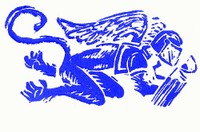Excerpt from White Crane Issue #40
 Superchrist
Superchrist
In A Superstate
by Malcolm Boyd
Editors Note: In the waning days of the 1950s, in the heyday of Marilyn Monroe and Doris Day and Bishop Sheen, Malcolm Boyd was embarking on a 30-book writing career that would span the next four decades, beginning with two books Crisis in Communication (1957) and Christ and Celebrity Gods (1958).
In an earlier, lay career, Boyd had been at the very pinnacle of show business, producing films and working with no less than the legendary Mary Pickford, rubbing elbows with the glitterati of the day. We all know the prolific Boyd from his many books, not the least of which is Are You Running With Me Jesus…but were you aware that he was also the very first president of the Television Producers Association of Hollywood? Oh yes, boys and girls, Boyd knows intimately whereof he speaks — then and now — and then he brought a unique insight into matters of celebrity and snake oil and “cheap grace.” It is no surprise that this is where his first spiritual commentary might start, his teacher at Union Theological Seminary, Reinhold Niebuhr, coined the phrase.
Both these books, and the later Christian: Its Meaning in an Age of Future Shock, in which he writes a chapter entitled “Superchrist of a Superstate: Political Manipulation of Christian” are nothing less than prescient, even prophetic, in their intuitions of the insidious culture of celebrity that was just then building steam, and the breakdown of the separation of church and state, a demagoguery whose fruition we are witnessing today. It is startling — maybe even a little bracing — to read passages of Crisis in Communication, and realize that, with the simple change of names from, say, “Marilyn” to “Madonna,” that Boyd could as easily have written the piece yesterday as he did 40 years ago.
White Crane asked our friend, the Reverend Canon Boyd, poet/writer-in-residence of the Los Angeles Episcopal Archdiocese, to revisit these writings and reflect on them here.
The whole problem began when I was a kid in school. My education got all screwed up. I was taught a pack of lies.
- I was taught that patriotism meant “my country, right or wrong.” (But how, it was suggested, could it ever be wrong?)
- I was taught war was justified if my country fought it.
- I was taught that black people were a bit lesser than human and called “niggers.” (If they don’t like this country, why don’t they go back to where they came from?)
- I was taught that Native Americans had killed kind and courageous (white) troops fighting for “our country,” and deserved to be punished and isolated.
- I was taught Latinos were meant to do manual labor and be treated as children. (Are they too lazy to learn English?)
- I was taught modern civilization was essentially good, incapable of committing horrors such as those of the past described in history books.
- I was taught homosexuals (the word wasn’t really supposed to be spoken in polite society) were social lepers, degenerates, intrinsically evil, damned by God.
My actual education commenced long after I left school — and unlearned a lot of things. And, learned new ones.
I learned there is a brand of fundamentalistic Christianity which tells the rest of the world that it awaits the Second Coming of Christ to solve pressing “social problems” such as hunger, starvation, war, racism, sexism, colonialism, grinding poverty, environmental destruction. It basks in the ineffable sort of prestige bestowed upon docile religion by seasoned manipulators of caesaro-papism—which means to say, the state using religion for its own purposes.
Theocracy provides well-trained clergy who publicly mouth politically supportive caricatures of prayer at government ceremonies or public assemblies, plead with a partisan god to let “our” side win our wars, and distort the gospel of Christ in mealy-mouthed “sermons” to the mighty in palace chapels and White House East Rooms.
All this would not be so dangerous were it not for today’s sophisticated technology. But — with almost insuperable irony—technology brings the McLuhan prophecy full circle so that the medium is the message. Take, for example, a giant revivalist rally—the lonely crowd flaunting religious symbols, and in the distance a superstar-cum-evangelist performing under bright lights. But where did JEEE-sus go? The betrayal of Jesus is perpetrated in his own name even as his own words are read aloud.
Against the backdrop of yet another American success story, I’ve discovered — to my genuine surprise — that there’s a commonly accepted belief in some form of encroaching doom. It may take the form of the death of a city, the destruction of a nation, or the end of human life in a part of the world. It may come from insoluble problems or inexorable forces within one’s own environment rather than from any form of enemy attack. It may be linked indissolubly to mounting violence as a way of life.
Indeed, Stanley Kubrick’s archetypal film “A Clockwork Orange” went so far as to depict modern worship of a god of violence. As ancient Aztecs tore human hearts from living bodies for a holy sacrifice, so young men in the film ran with verve as they stomped a helpless old man, gang-raped a woman while kicking to a pulp the face of her watching husband, and crushed the skull of another woman. This worship of a god is passionate, self-immolating, taut with commitment. These extremely devout youths are absolutely caught up in the liturgies and rites of worshiping their deity.
I must observe that such adherence to a creed represents far more profound communion with a god than the lukewarm, lifeless travesty of worship to be found in countless piously conventional churches. It seems to me that the god of violence is honored and loved more in American society than is the God of love and peace. Casual acceptance of such violence means that our humanity is seriously threatened. Writing in “The Day of the Locust,” Nathanael West warned that people consumed by the fury of an “awful, anarchic power…had it in them to destroy civilization.”
America’s soul is troubled. People feel betrayed, frustrated, restlessly anxious and scared to death. The gap between people’s unfilled spiritual needs and organized religion’s failure of nerve is soil for a demagogic, chauvinistic national religious movement linked to super patriotism and endless engagement in global warfare. This, I believe, is one of the most frightening prospects Americans will face if steps to prevent it are not taken now. I speak of religion with conformity built in and the most rigid doctrinal allegiance enforced.
At first subtly, then quite obviously, add patriotism to religion as a prime good of the nation. Then a mass-structured organization can more openly take on a quasi-military form. Leaders of state-sponsored religion can address masses of people in great arenas or on TV. Church and state move closer and closer together. In the early ‘70s we saw this take place. Government surveillance of private citizens was unprecedented in scope up to that time. We saw the emergence of “enemy lists” of citizens. At White House “prayer breakfasts” invited guests bowed their heads in unison for photo ops even as they knew bombs were falling on heads of innocent people abroad and, at home, the poor were being betrayed. So the corporate sins of an aggressive, imperialistic America went unacknowledged. No one confessed them. Who is confessing them now?
I do not want church and state to draw close together in a tragic misuse of religion. I want to be saved from Superchrist in a Superstate.
This is just an excerpt from this issue of White Crane. We are reader-supported and need you to subscribe to keep this conversation going. So to read more from this wonderful issue SUBSCRIBE to White Crane. Thanks!





